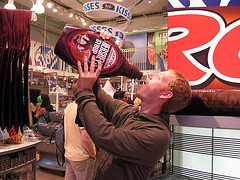
Photo by pandaposse
The simple answer is the inclusion of unhealthy ingredients. It’s not too difficult to identify an unhealthy diet – it’s one comprised mainly of unhealthy foods. The same goes for smoothies. After reading this blog post I’m confident you’ll be able to discern between healthy and unhealthy smoothies with ease.
First, I will attempt to cover all the things you don’t want in your smoothie, which cause the scale to tip in favor of unhealthy. Then I will list the healthy ingredients, and in doing so show you that creating healthy smoothies is actually pretty easy.
A quick note before moving onto the unhealthies. Most restaurants, chains, venues, and large events serving smoothies generally lean towards the unhealthy. For example, last summer I attended a major league baseball game and got quite excited when I saw a sign for smoothies. Much to my dismay, the so-called smoothie was nothing more than sugary slush.
Unhealthy Smoothie Bases
We’ll start with the liquid base of your smoothie, and what you want avoid like the plague.
Sugar laden fruit juices: Most fruit juices sold in super markets are nothing more than flavored sugar water.
Regular milk: Store bought milk (whether skim, 1%, 2%, or whole) comes from cows that are often mistreated, given hormones and antibiotics, and over milked. Chalk and pus have also been detected in the milk.
Tap water: Recent studies have revealed a plethora of undesired substances in regular old tap water. This includes, but is not limited to, trace amounts of pharmaceutical drugs, lead and arsenic, perchlorate (a toxic chemical found in rocket fuel), sucralose, and many other man-made chemicals.
Most bottled water: Most mainstream bottled water is nothing more than glorified tap water. Pepsi even admitted that Aquafina comes from tap water. For the definitive story on bottled water I highly recommend the documentary Tapped.
Unhealthy Smoothie Ingredients
Now onto the list of smoothie ingredients that I wouldn’t add into my blender if you paid me. An exhaustive list isn’t practical, but I’ll hit on the more obvious offenders.
- Ice cream and sherbet
- Chocolate syrups and powders – think Nestle
- Sugar as a sweetener
- Agave nectar – why
- Most store bought honey – why
- Non-organic peanut butters (Jif, Skippy, Smuckers)
- Cheap protein powders – why
- Chocolate pudding mix
- Cool Whip or whip cream
- Cream soda
At the end of the day, just use a little common sense in determining what not to add to your smoothie.
How To Make Your Smoothie Nice and Healthy
Now that you know what not to add to your smoothies, let’s get to what you can toss in the blender to make the healthiest smoothies ever! Instead of using the word organic over and over, I’ll mention here that using organic ingredients is always in your best interest. I realize this isn’t always possible and don’t beat yourself up over it. At the very least try to avoid the “Dirty Dozen“.
Healthy Smoothie Bases
Fresh juice: There’s nothing better than using fresh juice, whether from a juicer or squeezed.
Raw milk, almond and coconut milk: If you’re not lactose intolerant, raw milk is a great option. Almond milk and coconut milk (and water from young/Thai coconuts) are great to use too. I didn’t include soy milk because there’s evidence soy isn’t the health food it’s been marketed as, see here and here for reasons why you should avoid soy.
Good water: This includes water run through a good filter, legitimate bottled water (Spring Mountain, Starfire), distilled, purified, and the best option spring water. To locate spring water where you live, check out Find a Spring.
Tea: Using a healthy or medicinal tea can really improve the nutrition of your smoothie. In some circles “elixir” is the term used to designate these drinks.
Fermented beverages: Kefir (milk and water), kombucha, and Hindu lemonade. These are all extremely healthy options, especially when homemade.
Healthy Smoothie Ingredients
There may be some things on the list below that you’re not familiar with, don’t worry, in future recipes and posts I’ll explain why each ingredient is good for your health and a welcome addition to your smoothie.
- Fresh and frozen fruit
- Fresh vegetables
- Yogurt (organic, Greek, homemade)
- Superfoods (cacao, maca, aloe vera, goji berries, spirulina, etc)
- Herbs and spices (cinnamon, ginger, nutmeg, cayenne, mint, etc)
- Local and/or organic honey
- Local and/or maple syrup
- Stevia
- High quality protein powders
- High quality superfood green powders
- Hemp seeds and hemp protein
- Raw nuts and nut butters
- Various coconut products (shreds, flakes, raw meat, oil, butter)
- Chia seeds and chia seed gel
- Flax seeds and oil
- Oatmeal
- High quality salt (Celtic sea salt, pink Himalayan salt, Redmond salt, etc)
- Gelatin
- Colostrum
- Medicinal mushroom powders
- Chinese herbs
- Mineral supplements
As you can see there’s quite a few ingredients available to make healthy smoothies. The number of different concoctions and recipes is endless. Once you get the basics of smoothie making down, you can experiment and come up with your own favorite recipes.
I hope you found this information both informative and actionable. After all this talk of smoothies, I’m off to the kitchen to create my next masterpiece.
Please leave a comment below as I’d love to hear what you think of my “good” and “bad” list of smoothie ingredients.

Comments are closed.